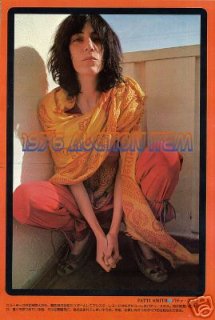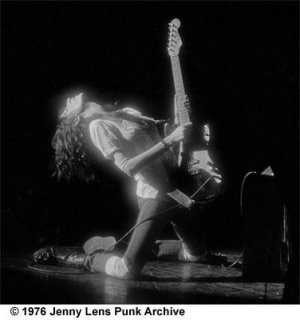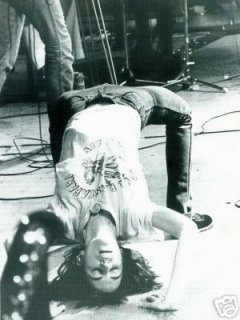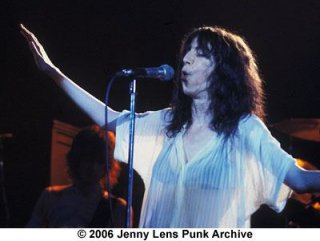...Guardian Interview continued
There were various factors that contributed to Smith's departure. "I met the person that I loved and wanted to marry, and I didn't want to be parted from him and he didn't want me to be parted from him either," she says. The man with whom she fell in love was Fred "Sonic" Smith, the rhythm guitar player in Detroit band the MC5 and later founder member of Sonic's Rendezvous Band. The pair moved to the outskirts of Detroit, had a son and a daughter, and for much of the 1980s Smith remained quietly out of view. To many it seemed another example of her contrary behaviour. For some while, rumours persisted of drug problems, and there were mutterings that she had let down her fans, that by conforming to the stereotypical role model of a wife and mother she had somehow negated all that she had achieved politically.
Smith has always been a politically charged person, but here, too, people have attempted to categorise her. After the release of her first single, a cover of Hey Joe, with the central wife-murdering figure of the original replaced by Patty Hearst, many sought to portray her as a feminist icon. There was obviously some basis to this, but this is another label she wriggles away from. "I never did my work to speak for women or speak to any faction," she insists. "I spoke for all people. I still feel that I speak for disenfranchised people, except that when I was younger, in 1975, it was a smaller group of disenfranchised people. Now I feel like we're all disenfranchised."
Indeed, it annoys her that today, even with the space created for them, few artists adopt any kind of political position. "Musicians, poets, artists, writers, everyone steered clear of [the Iraq] war, which was a great disappointment," she says. "And I don't understand it. I mean, you had someone like Susan Sontag, Steve Earle, there were a few people, but you could almost count them on one hand."
Smith, who supported Ralph Nader's Democrat campaign in 2000, playing at his rallies and speaking about him on stage at her own concerts, displays disdain for the Bush administration. She talks of a country made to feel it is divided "like the civil war", of the big, fireworky issues the government has ignited to make sure voters are distracted from the war, or other pressing matters. It pains her, for example, that the US should be discussing gay marriage and abortion when "they should look at the fact that fast food, obesity, is killing our children. I came out of my door the other day and six schoolchildren were sitting on my stoop and all had to be over 200lbs and all under 15 years old. I was so disturbed that I went back in the house for a minute. These are the kind of things people should be addressing."
Smith's own upbringing was far from privileged. She was born in Chicago, but the family moved to Mantua, New Jersey. The young Smith grew up sharing records with her siblings, and it was her mother who bought her books of poetry and opera discs from an early age. Though her father was an atheist, her mother was a Jehovah's Witness, and Smith grew up with a reverence for both the stories and language of the Bible that she still holds today. At 16, she left school, dropping out of teaching college after the birth of a child she would give up for adoption. She subsequently worked on a factory assembly line, writing and reading between her shifts and saving her money to enable her move to New York - an experience she documented on the flip side of Hey Joe with the song Piss Factory: "I'm gonna be somebody,/ I'm gonna get on that train, go to New York City,/ I'm gonna be so bad I'm gonna be a big star and I will never return,/ Never return, no, never return, to burn out in this piss factory."
At the end of the 70s, and a big star in New York City, Smith felt that she was becoming a person she did not recognise: a temperamental rock star. "Maybe even more important than [falling in love], I didn't feel that I was growing as an artist at that point. All of my energy was being put into peripheral things - interviews and getting my picture taken. Constantly. And concerts and touring and every minute going to radio stations." Some of this Smith found useful - it granted her a platform from which to discuss the matters she found politically important. "But in the end I wasn't growing, so the things that I had to talk about ... I just didn't know about life." She realised, too, that she had become one of those rock stars who swept through cities in a limousine with a police escort and a trail of paparazzi. "And I thought, I haven't done anything to merit this kind of attention."
She saw her retreat from stardom as an opportunity to study. "Because I was married to an extremely intelligent man who was well-versed in global politics and all kinds of things, I spent the 80s learning quite a bit about our world, about our political situation, about sports, learning how to be a citizen, learning to cook, learning how to sew hems on my kids' uniforms, learning how to nurse children, learning how to scrub diapers and a toilet. I mean, there's a lot to learn and I was, for a short period of time, living a very sheltered, privileged position for doing very little; for singing rock'n'roll songs. And I felt that I had to reassess that."
Smith is nothing if not a grafter. She prickles at the modern notion of rock as a glamorous vocation, of stars made overnight, of the MTV generation's iPodded consumerism. "You have to kick doors open yourself. When people come up to me and say, 'Patti, nobody wants to hear my CD and I don't have enough money for equipment,' I say, 'Well, get a job, y'know?' That's what I did. You get people who say, 'The government won't give me a grant and I can't do my art.' I say, 'f*ck you, it's your own fault, you expect the government to give you a hand? The government is corrupt. Do what it takes. You do babysitting jobs, you work in the factory, you work in the bookstore or become a pickpocket, y'know? But whatever. Get a job.' Work is really good for an artist." Her features sharpen and there is a fierce set to her mouth. "My son is one of the best guitar players I've ever heard. And how does he make his money? He does manual labour, he does landscaping, he digs ditches. He's out there sometimes eight to 12 hours a day because he lives in Detroit and it's hard to get work there. But it's good, it's good. Artists should work."
Today, Smith is holding her new volume of poems, Auguries of Innocence, named with a nod to William Blake. It has been more than a decade since Smith published a book of poetry. She has written constantly during this period, she says, often rising at five in the morning, before her children awoke, to write. But much of it has remained in notebooks. "The past 10 years, I've been really attending to raising my kids because they lost their father," she says, "so I was even more attentive than I had been in the past. That's another reason why I didn't write a book of poetry: it was so hard to address the loss of my husband in poems. I just ... well, I had a lot to write about that I just couldn't focus on." Fred Smith died suddenly of a heart attack in 1994, aged 45. When she speaks of him, her voice sounds soft and bruised. Asked which musician she thinks history has overlooked, she answers with a quiet futility: "Well, I think my late husband, Sonic. [His band] did a single called City Slang. Everybody should hear that. Everybody should hear Fred. They just should ... hear his voice and hear his guitar."
She sits here today, fingers brushing the pages of her book, explaining the griefs that infuse the work: the slaughter of sheep during foot and mouth disease; the death of a tramp in Belfast that she read about in a newspaper cutting; the culling of birds in the bombing of Iraq, woven with the deaths of her mother, her brother, her husband. "This poem was written for my brother's daughter," she says tenderly. "And this poem was written for my daughter, in losing her father - 'I saw you crying in your sleep ...' This is talking about my daughter and how she has arms like her father and ... and, anyway. And this one was written for my son, losing his father. It mentions ... my husband was a musician and before we buried him, my son placed his favourite guitar upon him. So this is why it says 'folding a guitar ...' So this little suite of poems, it finishes with Wilderness, which is for myself, in losing him." We look at Wilderness. "Do animals cry like humans," it reads. "As I having lost you/Yowled flagged/ Curled in a ball."
If anything defines Smith, it is her melding of the personal and the public, that quality of both looking out and looking in. She is a gyre of a woman, who has spent her 60 years moving from cultural outsider to artistic insider, from the public lyric to the personal verse, from fame to family, from the coast to the landlocked state. In 1979, when she withdrew from public life, she also retreated inland to Michigan. "It was a very difficult transition for me because I missed the city," she says. "But after a time I started seeing America [through] my husband's eyes. He was half-Cherokee; he had a love of the land that I really learned to appreciate through him. I always loved the sea, but [was] not so much connected with the land. And I rekindled a connection with the land through him."
She is eager, today, to speak of her love of the sea. "I love the sound of the waves, I love the salt, I love the gulls. There's nothing I don't like about it," she says gladly. "I don't swim but I like to walk in it like a kid. I make sandcastles and stuff. I love it." In New York sometimes she gets the urge to see the ocean. "And so I get on the F train and stay till the end of the line and get off at Coney Island. I'm by the sea."
She is looking out again now, speaking of her love of photography, of a proposed album of covers, everything from Jefferson Airplane to Jimi Hendrix and Tim Buckley. "It's volume one of my thank yous," she says. She feels there are rich years ahead. "Look at Herman Hesse - he wrote his masterpiece in his 60s," she says. "Some people are like shooting stars, they do their thing early and sometimes die young, and that's their lot in life. And some of us just plough on. And I'm really hoping that in this next decade I really do what I've always wanted to do, which is write something really good, like Little Women or Alice in Wonderland, something that people will just love." She smiles and spreads her slim, pale hands, like roots against the earthy darkness of her trousers. "And if I do that, I'll feel like even though I was sidetracked for some decades singing rock'n'roll and playing electric guitar, I'll have done my job".
· To order Auguries of Innocence by Patti Smith for £9.99 with free UK p&p, go to
guardian.co.uk/bookshop or call 0870 836 0875.
















